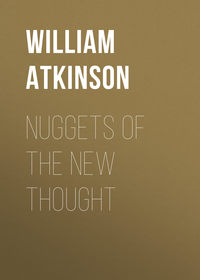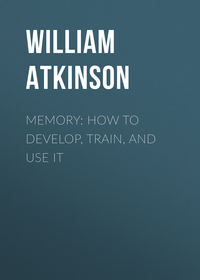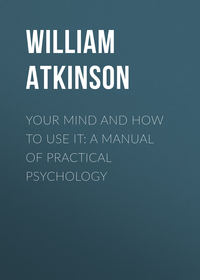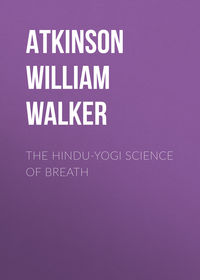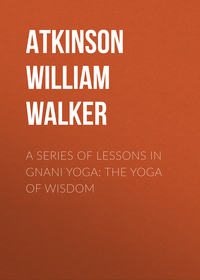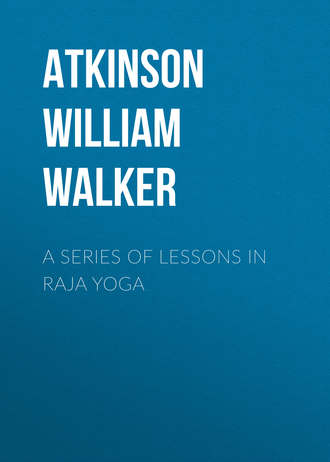 полная версия
полная версияA Series of Lessons in Raja Yoga
The majority of people in the present stage of the race development have but a faint conception of the reality of the "I." They accept the statement of its existence, and are conscious of themselves as an eating, sleeping, living creature—something like a higher form of animal. But they have not awakened to an "awareness" or realization of the "I," which must come to all who become real centres of Influence and Power. Some men have stumbled into this consciousness, or a degree of it, without understanding the matter. They have "felt" the truth of it, and they have stepped out from the ranks of the commonplace people of the world, and have become powers for good or bad. This is unfortunate to some extent, as this "awareness" without the knowledge that should accompany it may bring pain to the individual and others.
The Candidate must meditate upon the "I," and recognize it—feel it—to be a Centre. This is his first task. Impress upon your mind the word "I," in this sense and understanding, and let it sink deep down into your consciousness, so that it will become a part of you. And when you say "I," you must accompany the word with the picture of your Ego as a Centre of Consciousness, and Thought, and Power, and Influence. See yourself thus, surrounded by your world. Wherever you go, there goes the Centre of your world. YOU are the Centre, and all outside of you revolves around that Centre. This is the first great lesson on the road to Initiation. Learn it!
The Yogi Masters teach the Candidates that their realization of the "I" as a Centre may be hastened by going into the Silence, or State of Meditation, and repeating their first name over slowly, deliberately and solemnly a number of times. This exercise tends to cause the mind to centre upon the "I," and many cases of dawning Initiation have resulted from this practice. Many original thinkers have stumbled upon this method, without having been taught it. A noted example is that of Lord Tennyson, who has written that he attained a degree of Initiation in this way. He would repeat his own name, over and over, and the same time meditating upon his identity, and he reports that he would become conscious and "aware" of his reality and immortality—in short would recognize himself as a real center of consciousness.
We think we have given you the key to the first stage of meditation and concentration. Before passing on, let us quote from one of the old Hindu Masters. He says, regarding this matter: "When the soul sees itself as a Centre surrounded by its circumference—when the Sun knows that it is a Sun, and is surrounded by its whirling planets—then is it ready for the Wisdom and Power of the Masters."
THE KNOWLEDGE OF THE INDEPENDENCE OF THE "I" FROM THE BODY. Many of the Candidates find themselves prevented from a full realization of the "I" (even after they have begun to grasp it) by the confusing of the reality of the "I" with the sense of the physical body. This is a stumbling block that is easily overcome by meditation and concentration, the independence of the "I" often becoming manifest to the Candidate in a flash, upon the proper thought being used as the subject of meditation.
The exercise is given as follows: Place yourself in the State of Meditation, and think of YOURSELF—the Real "I"—as being independent of the body, but using the body as a covering and an instrument. Think of the body as you might of a suit of clothes. Realize that you are able to leave the body, and still be the same "I." Picture yourself as doing this, and looking down upon your body. Think of the body as a shell from which you may emerge without affecting your identity. Think of yourself as mastering and controlling the body that you occupy, and using it to the best advantage, making it healthy, strong and vigorous, but still being merely a shell or covering for the real "You." Think of the body as composed of atoms and cells which are constantly changing, but which are held together by the force of your Ego, and which you can improve at Will. Realize that you are merely inhabiting the body, and using it for your convenience, just as you might use a house.
In meditating further, ignore the body entirely, and place your thought upon the Real "I" that you are beginning to feel to be "you," and you will find that your identity—your "I"—is something entirely apart from the body. You may now say "my body" with a new meaning. Divorce the idea of your being a physical being, and realize that you are above body. But do not let this conception and realization cause you to ignore the body. You must regard the body as the Temple of the Spirit, and care for it, and make it a fit habitation for the "I." Do not be frightened if, during this meditation, you happen to experience the sensation of being out of the body for a few moments, and of returning to it when you are through with the exercise. The Ego is able (in the case of the advanced Initiate) of soaring above the confines of the body, but it never severs its connection at such times. It is merely as if one were to look out of the window of a room, seeing what was going on outside, and drawing in his head when he wishes. He does not leave the room, although he may place his head outside in order to observe what is doing in the street. We do not advise the Candidate to try to cultivate this sensation—but if it comes naturally during meditation, do not fear.
REALIZING THE IMMORTALITY AND INVINCIBILITY OF THE EGO. While the majority accept on faith the belief in the Immortality of the Soul, yet but few are aware that it may be demonstrated by the soul itself. The Yogi Masters teach the Candidates this lesson, as follows: The Candidate places himself in the State of Meditation, or at least in a thoughtful frame of mind, and then endeavors to "imagine" himself as "dead"—that is, he tries to form a mental conception of himself as dead. This, at first thought, appears a very easy thing to imagine, but as a matter of fact it is impossible to do so, for the Ego refuses to entertain the proposition, and finds it impossible to imagine it. Try it for yourself. You will find that you may be able to imagine your body as lying still and lifeless, but the same thought finds that in so doing You are standing and looking at the body. So you see that You are not dead at all, even in imagination, although the body may be. Or, if you refuse to disentangle yourself from your body, in imagination, you may think of your body as dead but You who refuse to leave it are still alive and recognize the dead body as a thing apart from your Real Self. No matter how you may twist it you cannot imagine yourself as dead. The Ego insists upon being alive in any of these thoughts, and thus finds that it has within itself the sense and assurance of Immortality. In case of sleep or stupor resulting from a blow, or from narcotics or anaesthetics, the mind is apparently blank, but the "I" is conscious of a continuity of existence. And so one may imagine himself as being in an unconscious state, or asleep, quite easily, and sees the possibility of such a state, but when it comes to imagining the "I" as dead, the mind utterly refuses to do the work. This wonderful fact that the soul carries within itself the evidence of its own immortality is a glorious thing, but one must have reached a degree of unfoldment before he is able to grasp its full significance.
The Candidate is advised to investigate the above statement for himself, by meditation and concentration, for in order that the "I" may know its true nature and possibilities, it must realize that it cannot be destroyed or killed. It must know what it is before it is able to manifest its nature. So do not leave this part of the teaching until you have mastered it. And it is well occasionally to return to it, in order that you may impress upon the mind the fact of your immortal and eternal nature. The mere glimmering of this conception of truth will give you an increased sense of strength and power, and you will find that your Self has expanded and grown, and that you are more of a power and Centre than you have heretofore realized.
The following exercises are useful in bringing about a realization of the invincibility of the Ego—its superiority to the elements.
Place yourself in the State of Meditation, and imagine the "I" as withdrawn from the body. See it passing through the tests of air, fire and water unharmed. The body being out of the way, the soul is seen to be able of passing through the air at will—of floating like a bird—of soaring—of traveling in the ether. It may be seen as able to pass through fire without harm and without sensation, for the elements affect only the physical body, not the Real "I." Likewise it may be seen as passing through water without discomfort or danger or hurt.
This meditation will give you a sense of superiority and strength, and will show you something of the nature of the real "I." It is true that you are confined in the body, and the body may be affected by the elements, but the knowledge that the Real "I" is superior to the body—superior to the elements that affect the body—and cannot be injured any more than it can be killed, is wonderful, and tends to develop the full "I" consciousness within you. For You—the Real "I"—are not body. You are Spirit. The Ego is Immortal and Invincible, and cannot be killed and harmed. When you enter into this realization and consciousness, you will feel an influx of strength and power impossible to describe. Fear will fall from you like a worn-out cloak, and you will feel that you are "born again." An understanding of this thought, will show you that the things that we have been fearing cannot affect the Real "I," but must rest content with hurting the physical body. And they may be warded off from the physical body by a proper understanding and application of the Will.
In our next lesson, you will be taught how to separate the "I" from the mechanism of the mind—how you may realize your mastery of the mind, just as you now realize your independence of the body. This knowledge must be imparted to you by degrees, and you must place your feet firmly upon one round of the ladder before you take the next step.
The watchword of this First Lesson is "I." And the Candidate must enter fully into its meaning before he is able to progress. He must realize his real existence—independent of the body. He must see himself as invincible and impervious to harm, hurt, or death. He must see himself as a great Centre of Consciousness—a Sun around which his world revolves. Then will come to him a new strength. He will feel a calm dignity and power, which will be apparent to those with whom he comes in contact. He will be able to look the world in the face without flinching, and without fear, for he will realize the nature and power of the "I." He will realize that he is a Centre of Power—of Influence. He will realize that nothing can harm the "I," and that no matter how the storms of life may dash upon the personality, the real "I"—the Individuality—is unharmed. Like a rock that stands steadfast throughout the storm, so does the "I" stand through the tempests of the life of personality. And he will know that as he grows in realization, he will be able to control these storms and bid them be still.
In the words of one of the Yogi Masters: "The 'I' is eternal. It passes unharmed through the fire, the air, the water. Sword and spear cannot kill or wound it. It cannot die. The trials of the physical life are but as dreams to it. Resting secure in the knowledge of the 'I,' Man may smile at the worst the world has to offer, and raising his hand he may bid them disappear into the mist from which they emerged. Blessed is he who can say (understandingly) 'I'."
So dear Candidate, we leave you to master the First Lesson. Be not discouraged if your progress be slow. Be not cast down if you slip back a step after having gained it. You will gain two at the next step. Success and realization will be yours. Mastery is before. You will Attain. You will Accomplish. Peace be with you.
MANTRAMS (AFFIRMATIONS) FOR THE FIRST LESSON
"I" am a Centre. Around me revolves my world.
"I" am a Centre of Influence and Power.
"I" am a Centre of Thought and Consciousness.
"I" am Independent of the Body.
"I" am Immortal and cannot be Destroyed.
"I" am Invincible and cannot be Injured.
THE SECOND LESSON.
THE EGO'S MENTAL TOOLS
In the First Lesson we gave instruction and exercises designed to awaken the consciousness of the Candidate to a realization of the real "I." We confined our instructions to the preliminary teachings of the reality of the "I," and the means whereby the Candidate might be brought to a realization of his real Self, and its independence from the body and the things of the flesh. We tried to show you how you might awaken to a consciousness of the reality of the "I"; its real nature; its independence of the body; its immortality; its invincibility and invulnerability. How well we have succeeded may be determined only by the experience of each Candidate, for we can but point out the way, and the Candidate must do the real work himself.
But there is more to be said and done in this matter of awakening to a realization of the "I." So far, we have but told you how to distinguish between the material coverings of the Ego and the "I" itself. We have tried to show you that you had a real "I," and then to show you what it was, and how it was independent of the material coverings, etc. But there is still another step in this self analysis—a more difficult step. Even when the Candidate has awakened to a realization of his independence of the body, and material coverings, he often confounds the "I" with the lower principles of the mind. This is a mistake. The Mind, in its various phases and planes, is but a tool and instrument of the "I," and is far from being the "I" itself. We shall try to bring out this fact in this lesson and its accompanying exercises. We shall avoid, and pass by, the metaphysical features of the case, and shall confine ourselves to the Yogi Psychology. We shall not touch upon theories, nor attempt to explain the cause, nature and purpose of the Mind—the working tool of the Ego—but instead shall attempt to point out a way whereby you may analyze the Mind and then determine which is the "not I" and which is the real "I." It is useless to burden you with theories or metaphysical talk, when the way to prove the thing is right within your own grasp. By using the mind, you will be able to separate it into its parts, and force it to give you its own answer to the questions touching itself.
In the second and third lessons of our "Fourteen Lessons," we pointed out to you the fact that man had three Mental Principles, or subdivisions of mind, all of which were below the plane of Spirit. The "I" is Spirit, but its mental principles are of a lower order. Without wishing to unduly repeat ourselves, we think it better to run hastily over these three Principles in the mind of Man.
First, there is what is known as the Instinctive Mind, which man shares in common with the lower animals. It is the first principle of mind that appears in the scale of evolution. In its lowest phases, consciousness is but barely perceptible, and mere sensation is apparent. In its higher stages it almost reaches the plane of Reason or Intellect, in fact, they overlap each other, or, rather, blend into each other. The Instinctive Mind does valuable work in the direction of maintaining animal life in our bodies, it having charge of this part of our being. It attends to the constant work of repair; replacement; change; digestion; assimilation; elimination, etc., all of which work is performed below the plane of consciousness.
But this is but a small part of the work of the Instinctive Mind. For this part of the mind has stored up all the experiences of ourselves and ancestors in our evolution from the lower forms of animal life into the present stage of evolution. All of the old animal instincts (which were all right in their place, and quite necessary for the well-being of the lower forms of life) have left traces in this part of the mind, which traces are apt to come to the front under pressure of unusual circumstances, even long after we think we have outgrown them. In this part of the mind are to be found traces of the old fighting instinct of the animal; all the animal passions; all the hate, envy, jealousy, and the rest of it, which are our inheritances from the past. The Instinctive Mind is also the "habit mind" in which is stored up all the little, and great, habits of many lives, or rather such as have not been entirely effaced by subsequent habits of a stronger nature. The Instinctive Mind is a queer storehouse, containing quite a variety of objects, many of them very good in their way, but others of which are the worst kind of old junk and rubbish.
This part of the mind also is the seat of the appetites; passions; desires; instincts; sensations; feelings and emotions of the lower order, manifested in the lower animals; primitive man; the barbarian; and the man of today, the difference being only in the degree of control over them that has been gained by the higher parts of the mind. There are higher desires, aspirations, etc., belonging to a higher part of the mind, which we will describe in a few minutes, but the "animal nature" belongs to the Instinctive Mind. To it also belong the "feelings" belonging to our emotional and passional nature. All animal desires, such as hunger and thirst; sexual desires (on the physical plane); all passions, such as physical love; hatred; envy; malice; jealousy; revenge, etc., are part of this part of the mind. The desire for the physical (unless a means of reaching higher things) and the longing for the material, belong to this region of the mind. The "lust of the flesh; the lust of the eyes; the pride of life," belong to the Instinctive Mind.
Take note, however, that we are not condemning the things belonging to this plane of the mind. All of them have their place—many were necessary in the past, and many are still necessary for the continuance of physical life. All are right in their place, and to those in the particular plane of development to which they belong, and are wrong only when one is mastered by them, or when he returns to pick up an unworthy thing that has been cast off in the unfoldment of the individual. This lesson has nothing to do with the right and wrong of these things (we have treated of that elsewhere) and we mention this part of the mind that you may understand that you have such a thing in your mental make-up, and that you may understand the thought, etc., coming from it, when we start in to analyze the mind in the latter part of this lesson. All we will ask you to do at this stage of the lesson is to realize that this part of the mind, while belonging to you, is not You, yourself. It is not the "I" part of you.
Next in order, above the Instinctive Mind, is what we have called the Intellect, that part of the mind that does our reasoning, analyzing; "thinking," etc. You are using it in the consideration of this lesson. But note this: You are using it, but it is not You, any more than was the Instinctive Mind that you considered a moment ago. You will begin to make the separation, if you will think but a moment. We will not take up your time with a consideration of Intellect or Reason. You will find a good description of this part of the mind in any good elementary work on Psychology. Our only idea in mentioning it is that you may make the classification, and that we may afterward show you that the Intellect is but a tool of the Ego, instead of being the real "I" itself, as so many seem to imagine.
The third, and highest, Mental Principle is what is called the Spiritual Mind, that part of the mind which is almost unknown to many of the race, but which has developed into consciousness with nearly all who read this lesson, for the fact that the subject of this lesson attracts you is a proof that this part of your mental nature is unfolding into consciousness. This region of the mind is the source of that which we call "genius," "inspiration," "spirituality," and all that we consider the "highest" in our mental make-up. All the great thoughts and ideas float into the field of consciousness from this part of the mind. All the great unfoldment of the race comes from there. All the higher mental ideas that have come to Man in his upward evolutionary journey, that tend in the direction of nobility; true religious feeling; kindness; humanity; justice; unselfish love; mercy; sympathy, etc., have come to him through his slowly unfolding Spiritual Mind. His love of God and of his fellow man have come in this way. His knowledge of the great occult truths reach him through this channel. The mental realization of the "I," which we are endeavoring to teach in these lessons, must come to him by way of the Spiritual Mind unfolding its ideas into his field of consciousness.
But even this great and wonderful part of the mind is but a tool—a highly finished one, it is true, but still a tool—to the Ego, or "I."
We propose to give you a little mental drill work, toward the end that you may be able more readily to distinguish the "I" from the mind, or mental states. In this connection we would say that every part, plane, and function of the mind is good, and necessary, and the student must not fall into the error of supposing that because we tell him to set aside first this part of the mind and then that part, that we are undervaluing the mind, or that we regard it as an encumbrance or hindrance. Far from this, we realize that it is by the use of the mind that Man is enabled to arrive at a knowledge of his true nature and Self, and that his progress through many stages yet will depend upon the unfolding of his mental faculties.
Man is now using but the lower and inferior parts of his mind, and he has within his mental world great unexplored regions that far surpass anything of which the human mind has dreamed. In fact, it is part of the business of "Raja Yoga" to aid in unfolding these higher faculties and mental regions. And so far from decrying the Mind, the "Raja Yoga" teachers are chiefly concerned in recognizing the Mind's power and possibilities, and directing the student to avail himself of the latent powers that are inherent in his soul.
It is only by the mind that the teachings we are now giving you may be grasped and understood, and used to your advantage and benefit. We are talking direct to your mind now, and are making appeals to it, that it may be interested and may open itself to what is ready to come into it from its own higher regions. We are appealing to the Intellect to direct its attention to this great matter, that it may interpose less resistance to the truths that are waiting to be projected from the Spiritual Mind, which knows the Truth.
MENTAL DRILL
Place yourself in a calm, restful condition, that you may be able to meditate upon the matters that we shall place before you for consideration. Allow the matters presented to meet with a hospitable reception from you, and hold a mental attitude of willingness to receive what may be waiting for you in the higher regions of your mind.
We wish to call your attention to several mental impressions or conditions, one after another, in order that you may realize that they are merely something incident to you, and not YOU yourself—that you may set them aside and consider them, just as you might anything that you have been using. You cannot set the "I" aside and so consider it, but the various forms of the "not I" may be so set aside and considered.
In the First Lesson you gained the perception of the "I" as independent from the body, the latter merely being an instrument for use. You have now arrived at the stage when the "I" appears to you to be a mental creature—a bundle of thoughts, feelings, moods, etc. But you must go farther. You must be able to distinguish the "I" from these mental conditions, which are as much tools as is the body and its parts.
Let us begin by considering the thoughts more closely connected with the body, and then work up to the higher mental states.
The sensations of the body, such as hunger; thirst; pain; pleasurable sensations; physical desires, etc., etc., are not apt to be mistaken for essential qualities of the "I" by many of the Candidates, for they have passed beyond this stage, and have learned to set aside these sensations, to a greater or lesser extent, by an effort of the Will, and are no longer slaves to them. Not that they do not experience these sensations, but they have grown to regard them as incidents of the physical life—good in their place—but useful to the advanced man only when he has mastered them to the extent that he no longer regards them as close to the "I." And yet, to some people, these sensations are so closely identified with their conception of the "I" that when they think of themselves they think merely of a bundle of these sensations. They are not able to set them aside and consider them as things apart, to be used when necessary and proper, but as things not fastened to the "I." The more advanced a man becomes the farther off seem these sensations. Not that he does not feel hungry, for instance. Not at all, for he recognizes hunger, and satisfies it within reason, knowing that his physical body is making demands for attention, and that these demands should be heeded. But—mark the difference—instead of feeling that the "I" is hungry the man feels that "my body" is hungry, just as he might become conscious that his horse or dog was crying for food insistently. Do you see what we mean? It is that the man no longer identifies himself—the "I"—with the body, consequently the thoughts which are most closely allied to the physical life seem comparatively "separate" from his "I" conception. Such a man thinks "my stomach, this," or "my leg, that," or "my body, thus," instead of "'I,' this," or "'I' that." He is able, almost automatically, to think of the body and its sensations as things of him, and belonging to him, which require attention and care, rather than as real parts of the "I." He is able to form a conception of the "I" as existing without any of these things—without the body and its sensations—and so he has taken the first step in the realization of the "I."




